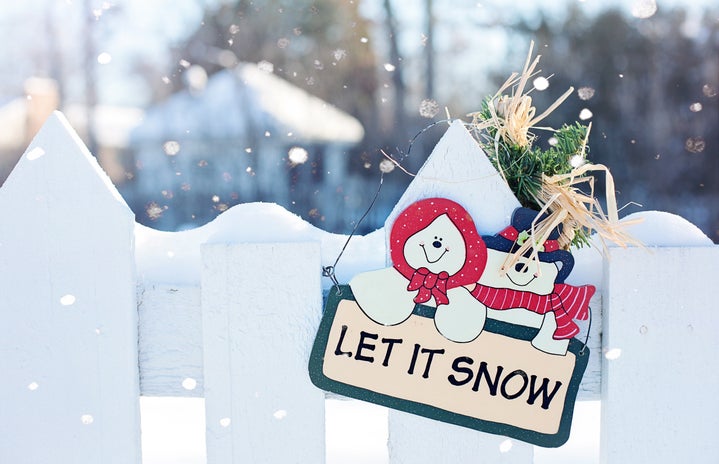My fellow New Englanders, it’s that time of year: the warm weather and long days are over, replaced with bitter cold that also brings a bitter sadness.
Seasonal Affective Disorder, more commonly known as Seasonal Depression, is a form of depression that is stronger during certain times of the year, typically fall and winter. It is unknown exactly what causes SAD, but most doctors believe it is linked to a lack of sunlight which comes from the shorter days. It is why a lot of us feel much more down during the colder months, but immediately feel ten times happier when the sun begins to peek its way out in the springtime.
True SAD is characterized by feelings of depression completely going away in the warmer months, but many people experience similar symptoms of the condition without having a diagnosis. Just because winter blues are common, does not mean that you should just accept them. There are multiple things that you can do to make yourself feel better when it is cold and dreary outside; here are seven tips that I find help me when I get into a funk.
1. Take Vitamin D supplements
The sun provides us with ample amounts of Vitamin D in the summertime, but as the days get shorter, the amount of Vitamin D we can naturally get decreases. SAD, and the symptoms it causes, are linked to a Vitamin D deficiency; so it makes sense why it occurs during the fall and winter. Although there is not enough research to prove Vitamin D supplements help with seasonal depression, the research we do have says supplements might help you get back to feeling happy and healthy even when it is freezing outside. However, there are a few other ways you can get in that extra Vitamin D:
2. Try light therapy
If you are unable to get much exposure to natural light, studies have shown that light therapy can be beneficial. Light therapy involves exposing yourself to bright artificial light during the colder months. This is usually done by sitting in front of a “light box,” which can mimic sunlight and essentially trick your brain into thinking that you are out in the warm sunshine. A study done by Harvard Medical School says light therapy can not only help with SAD but also general major depression and perinatal depression. There are lots of inexpensive light boxes you can buy, some as low as $20, and countless people have said this is something they rely on during the winter.
3. Exercise, exercise, exercise
This advice is something I preach year-round, but the positive differences I feel in my mind and body after a good workout are unreal. Exercising, contrary to what you would think, actually gives you more energy, which allows you to be more productive during the day, brightening your mood. Even just a small walk every day can help; I particularly like to go to group fitness classes at the Rec this time of year because it allows me to see other people. And speaking of seeing other people…
4. Talk to people (In real life, not just online)
It is so easy to stay in your house all day except for when you absolutely need to (like going to class and work), but socializing is so crucial for our mental health, especially in the winter when we are even more susceptible to symptoms of depression. This time of year, if I am invited out to go somewhere, I make an effort to always say yes because I know that I tend to feel worse the longer I’m alone. The day of I almost always feel like canceling, but there has never been a time where I regretted spending time with my friends. However, nearly 100% of the time, I regret canceling or saying no to begin with. Finding that healthy balance between seeing friends and overworking yourself is of course important, and you don’t want to fall on either end of the spectrum.
5. Find an indoor hobby
Just because we are stuck inside for a few months doesn’t mean we can’t be productive! Do something you enjoy that also relaxes you: I for one find myself reading much more during the colder months. Not only is it stimulating for my brain, it is a good way to stay busy and distracted. Whatever it is that you enjoy, take some time out of each day to work on it. Or if you don’t have a hobby you currently enjoy, it’s a great time to start one!
6. Take a weekend to go someplace warm, if you are able to
This is definitely a tip that I acknowledge the majority of people are not able to do, however, if you are able to take some time away, I highly recommend it. I am lucky to have friends who live in warmer states, and if my schedule allows it, I try to take a long weekend and go visit them. Being in the warm sunshine even just for a few days is often enough for me to see the light at the end of the tunnel.
7. Reach out for help if you think it is necessary
It is important to note that none of these methods are foolproof ways to treat seasonal depression, and sometimes those feelings of sadness will persist no matter what you do. If that is the case, I highly encourage you to speak to someone, whether it’s a trusted friend or a professional, before things get worse. Depression can get very intense very fast, and it can be hard to forget that there are plenty of people in this world who love you. So don’t be afraid to lean on those people when you need to.
resources
If you or someone you know is seeking help for mental health concerns, visit the National Alliance on Mental Illness (NAMI) website, or call 1-800-950-NAMI(6264). For confidential treatment referrals, visit the Substance Abuse and Mental Health Services Administration (SAMHSA) website, or call the National Helpline at 1-800-662-HELP(4357). In an emergency, contact the National Suicide Prevention Lifeline at 1-800-273-TALK(8255) or call 911.



